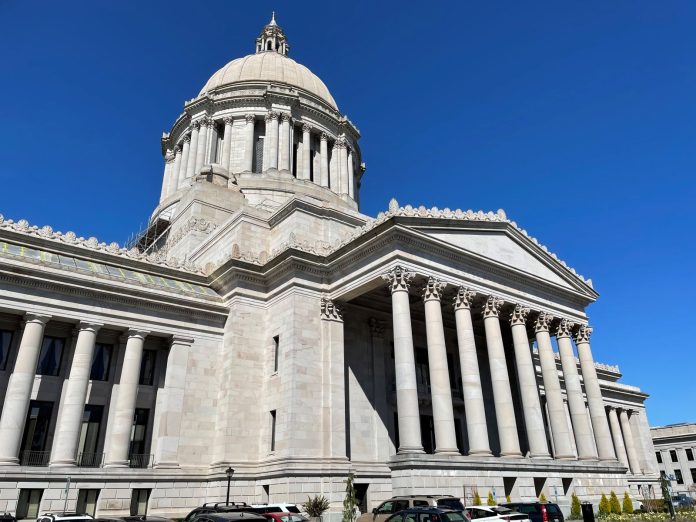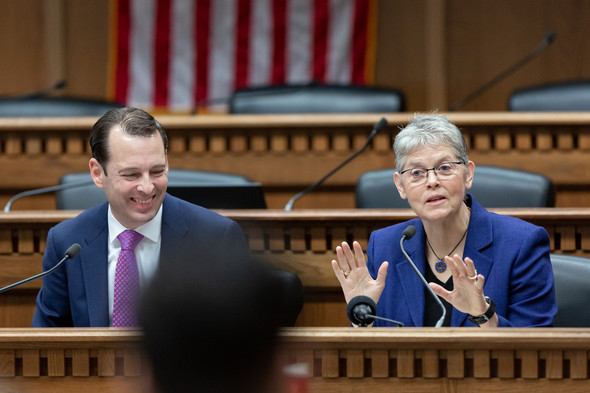
Partnering with Republicans on housing supply may have helped doom tenant legislation.
Last Wednesday marked a major deadline for bills in the Washington State Legislature, and rent stabilization didn’t make the cut. State Democratic leaders had talked about the need for a three-legged stool of housing supply, subsidy, and stability at the start of session. Halfway through session, housing supply bills are advancing, but stability has fallen by the wayside.
Proposed by Bellingham Rep. Alex Ramel, House Bill 1389 would have capped rent increases at 3% or at the rate of inflation (whichever is higher) up to 7%. The bill provided an exemption for new buildings for their first 12 years of occupancy, but that was not enough to tamp down opposition from the real estate lobby.
Even House Bill 1124, which only requires landlords give six-months notice before issuing large rent increases, failed to make it out of the House. Naturally, this has left tenant advocates frustrated.
“Many interventions and investments are needed to address our housing crisis in Washington, but rent stabilization is the only one that can directly and quickly help the 40% of Washingtonians who are renters to stay in their homes and stop being victims of destabilizing and unreasonable rent increases,” said Michele Thomas, Advocacy and Policy Director for the Washington Low Income Housing Alliance, in a statement.
Rent control has been illegal in Washington State since the legislature passed a ban in 1981. The ban has thwarted Seattle’s efforts to regulate rents at the municipal level. While the consensus among economists is largely against rent control, empirical research has not been able to tie ill effects to softer rent stabilization regimes, like HB 1389. In fact, a growing body of research has provided support for rent stabilization. Oregon passed statewide rent stabilization in 2019, pairing it with legislation triggering single family zoning reform.
Advocates mobilized considerable support for rent stabilization, including a Washington Tenants Union petition that exceeded 19,000 signatures. A December poll of Washington voters found 63% support taking measures to protect renters from unfair rent increases. Neither direct appeals or public opinion polling was enough to sway representatives.
“Thousands of tenants across Washington made their voices heard, and told lawmakers to do something about rent gouging during this session. The legislation didn’t make it through the cutoff yesterday, but the fight is not over,” Washington Low Income Housing Institute said in a tweet.
A few tenant rights bills are still alive, although their impact wouldn’t be as far-reaching. A eviction reform bill from Bellevue Sen. Patty Kuderer (House Bill 5197) did advance, as did House Bill 1074 requiring landlords to provide documentation of damages when they do not return a tenant’s security deposit.
At a media availability following the cutoff, House Speaker Laurie Jinkins bristled at a question about rent stabilization and spun the other bills that did advance as providing some additional stability for tenants.
“I don’t think it’s fair to say we did nothing on stabilization,” Jinkins said.
House Majority Leader Joe Fitzgibbons (D – Burien) piled on to argue most major legislation takes longer than one year to come to fruition and painted rent stabilization as taking a big step forward that set it up for success down the road.
“This is the first time that we’ve really had a serious debate about rent regulation that I can remember, and I think that it was a pretty robust debate — that bill got all the way through the Housing Committee and the Appropriations Committee,” Fitzgibbon said. “I think it’s the kind of thing that is a really good starting point for a more successful effort on rent regulation in a future year.”
At his cutoff press conference, Governor Jay Inslee, meanwhile, argued supply was the most important “longest leg” of the stool and downplayed the significance of not passing stabilization. “If you don’t increase the supply, there won’t be housing at any cost or any rent,” he said.
Why rent stabilization failed
The real reasons behind the failure of rent stabilization and anti-gouging efforts are not something party leaders have divulged. House Speaker Jinkins acknowledged the logistics of overcoming expected Republican stall tactics impacted her decision to pull HB 1124 from the floor calendar and could have impeded other priority bills. Nonetheless, with their strong governing majorities, Democrats had the ability to manipulate the schedule and rules however they like and could have avoided the legislative logjam and protected priority bills. But was rent stabilization a priority?

The Stranger‘s Rich Smith’s autopsy of the bills noted that many legislators are landlords, the vast majority are homeowners, and very few are tenants. The State Legislature has 27 landlords, but just 10 members who rent rather than own their homes, by Smith’s tally. Tenant issues just don’t appear to resonate in a landlord-heavy legislature, especially with the real estate lobby among the top contributors in campaign cash.
Beyond some Democrats simply not getting the issue, additional friction was provided this year by the deal Democrats brokered on their housing supply bills. Worried they wouldn’t have enough votes within their own caucus after coming up short in 2022, Democrats made inroads with Republicans on their housing supply bills, and Rep. Andrew Barkis (R- LD2 Yelm) took a leadership role in shepherding HB 1110 and lining up support.
“If we walk outta here in April and we have not passed significant, substantial housing policy then I would consider it a failure,” Barkis told The Urbanist in a January interview. However, that partnership did not appear to be without some conditions.
“I’m a little worried about other bills that are floating out there right now, either around some significant climate policy, or when it comes to building landlord tenant law, that’s being floated out, anything that might be detrimental to working together,” Barkis added.
Working with Republicans helped HB 1110 clear the House by a wide 75 to 21 margin. However with only three Democrats defecting, it turns out the Republicans weren’t necessary to provide a majority. Democrats enjoy a 58 – 40 advantage in the house and lost only Auburn Rep. Chris Stearns (D – LD47 Auburn) and Kirkland Reps Amy Walen (D – LD48 Bellevue) and Larry Springer (D – LD45 Totem Lake) on the vote. The extra 20 Republican votes were nice, but if the cost was punting on rent stabilization and climate legislation, that’s a pretty big tradeoff.
Road to passage for the housing stool
Republican cooperation may end up being more crucial in the State Senate. Democrats enjoy a 29-20 advantage there, but it’s not hard to imagine five Democrats defecting. Some possible squeaky wheels among Senate Democrats include Lisa Wellman of Mercer Island, Mark Mullet of Issaquah, Kevin Van De Wege of Sequim, Karen Keiser of Des Moines, Claudia Kaufmann of Auburn, and Jesse Salomon of Shoreline.
Centralia Sen. John Braun signed on as the Republican co-sponsor of the senate companion to HB 1110, but it’s not clear he can deliver as much of his caucus as Barkis did. Plus, for Republicans, the impulse to sabotage the Democratic agenda may get stronger as bills get closer to the finish line.
The transit-oriented development (TOD) bill requiring greater density near high capacity transit passed the Senate and has moved on to the House, where it seems to have a strong chance to pass given the decisive vote for the middle housing bill. But leaving exclusionary single family zoning unaddressed more broadly would certainly be a big letdown.
If the missing middle bill ends up floundering, the lack of action on rent stabilization could end up being all the more regrettable. In that scenario, will Democrats be able to say 2023 was the year of housing?
Doug Trumm is publisher of The Urbanist. An Urbanist writer since 2015, he dreams of pedestrian streets, bus lanes, and a mass-timber building spree to end our housing crisis. He graduated from the Evans School of Public Policy and Governance at the University of Washington in 2019. He lives in Seattle's Fremont neighborhood and loves to explore the city by foot and by bike.


